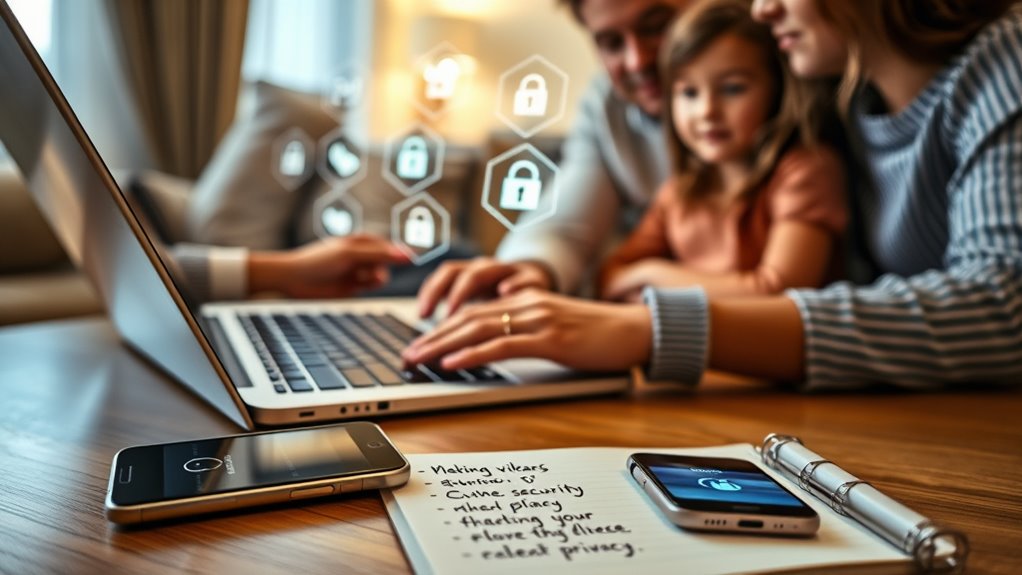To protect your family’s data and privacy online, you should regularly update devices with security patches, use strong, unique passwords stored in a password manager, and enable two-factor authentication. Set social media profiles to private, use parental controls, and teach responsible online habits. Back up important data, stay informed about privacy laws, and review account settings frequently. Keeping your family safe online is ongoing, but following these steps will help you strengthen your defenses—continue to explore these vital tips.
Key Takeaways
- Use strong, unique passwords for all accounts and enable two-factor authentication for added security.
- Regularly update devices, systems, and apps with the latest security patches.
- Set privacy settings on social media profiles to private and monitor online activity regularly.
- Back up important family data securely to cloud services or external drives.
- Educate family members about safe online practices and supervise children’s internet use.

In today’s digital world, safeguarding your family’s data and privacy online is more important than ever. You need to be proactive about protecting every device and account your family uses. Start by verifying all your devices and systems are updated regularly with the latest security patches. These updates fix vulnerabilities that hackers might exploit. Next, use strong, unique passwords for each account, avoiding common words or easily guessable information. Consider using a password manager to keep track of them securely. Enabling two-factor authentication adds an extra layer of protection, requiring a second verification step before granting access. This simple step can prevent unauthorized logins even if your passwords are compromised.
Protect your family online by updating devices, using strong passwords, and enabling two-factor authentication.
Backing up important data regularly is also vital. Use secure cloud storage or external drives to save copies of essential files, so you’re prepared if your device gets infected or stolen. Antivirus software is your first line of defense against malware and viruses. Install reputable programs and keep them updated to detect and remove threats promptly. These measures help secure your digital environment and keep your family safe from cyber threats. Additionally, investing in specialized security tools like firewalls and anti-malware programs can further strengthen your defenses against emerging online threats.
When it comes to protecting your children’s online presence, set their social media profiles to private, limiting who can see their content. Implement parental controls to restrict access to harmful sites and inappropriate content. Teach your children responsible sharing practices, emphasizing what’s safe to post and what’s not. Regularly monitor their online activity and review their friend or follower lists to identify potential risks. Open communication is key—talk about online safety openly and make sure they know they can come to you with concerns or questions.
Understanding laws like COPPA helps you navigate your children’s online privacy rights. This law requires websites to get parental consent before collecting data from kids under 13, aiming to protect their personal information from misuse. Stay informed about recent amendments addressing data monetization and targeted advertising, and ensure any online platform your children use complies with these rules. This knowledge empowers you to advocate for their safety and privacy.
Safeguarding your family’s digital footprint involves removing shared accounts that could lead to unauthorized access and regularly reviewing online activity. Educate everyone in your household about digital privacy, and set privacy settings on devices and accounts to limit data exposure. Using VPNs can add a layer of security when browsing, especially on public Wi-Fi. Installing safety software that blocks harmful content and establishing clear boundaries for online activities help create a safer digital environment. Foster open communication so family members feel comfortable discussing online issues, and stay informed about the latest threats and safety measures. Utilizing resources from organizations like the Family Online Safety Institute can provide additional guidance to keep your family protected in the digital space.
Frequently Asked Questions
How Can I Detect if My Family’S Devices Have Been Hacked?
You can detect if your family’s devices are hacked by watching for signs like unusual battery drain, unfamiliar apps, or increased data usage. Pay attention to slow performance, strange messages, or account activity changes. If you notice these, run antivirus scans, review app permissions, and update software. Also, check for suspicious login attempts or unexpected password resets, which could indicate hacking or malware presence.
What Are the Best Tools for Monitoring Children’S Online Activity?
You want to keep your kids safe online, and the best tools help you monitor activity, filter content, and set limits. Apps like Bark, Norton Family, Qustodio, Aura, and Net Nanny offer real-time alerts, web filtering, screen time controls, and device tracking. They’re user-friendly, cross-platform, and adaptable, giving you peace of mind while guiding your children’s digital habits. With these tools, you stay connected, informed, and proactive in safeguarding their online experiences.
How Do I Secure Smart Home Devices From Cyber Threats?
To secure your smart home devices from cyber threats, start by regularly updating their firmware and software to fix vulnerabilities. Change default passwords to strong, unique ones, and avoid using the same password across devices. Segment your network by creating a separate Wi-Fi for your smart devices, and disable any unused features or ports to reduce entry points. Use monitoring tools to spot suspicious activity early and stay ahead of potential attacks.
What Should I Do if My Family’S Personal Data Is Stolen?
If your family’s personal data is stolen, you should act quickly. Assess what data was taken and contact the affected companies for guidance. Notify credit bureaus to place fraud alerts, and report the theft to authorities like the police and FTC. Secure your online accounts by changing passwords, freezing credit, and monitoring bank statements regularly. Keep detailed records and follow recovery steps to protect your family’s financial future and rebuild trust.
How Can I Educate My Kids About Online Privacy Risks Effectively?
Imagine your kids as brave explorers in a vast digital jungle. To guide them safely, make privacy lessons engaging and relatable, like using real-life stories or interactive games. Talk openly about online risks, model good behaviors, and keep up with new tech trends. Empower them to make smart choices, and stay involved with regular chats and setting boundaries. Your active guidance turns digital dangers into manageable adventures.
Conclusion
So, after all these tips, it’s amusing how we spend so much time safeguarding our devices while often neglecting the simplest step: actually thinking about what we share. Ironically, in a world obsessed with digital security, a single careless click can undo all your efforts. Remember, protecting your family’s data isn’t just about fancy passwords or privacy settings—it’s about staying vigilant and aware. Because in the end, the biggest threat might just be your own click-happy habits.










